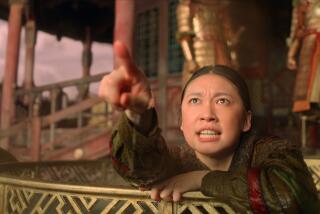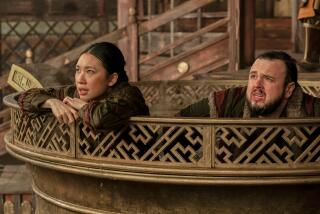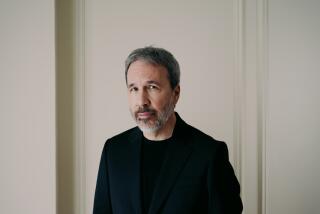Philip K. Dick’s fantastical short stories will be brought to life in Amazon Prime’s ‘Electric Dreams’
Veteran TV producer-director Michael Dinner recalls being approached five years ago by Isa Dick Hackett, the daughter of influential science fiction author Philip K. Dick, about adapting some of her father’s short stories for TV.
“She said, ‘Are you familiar?’” Dinner, best known for his work on several hit series including “The Wonder Years” and “Justified,” said recently. “And I said, ‘Well, sure.’ Then she said, ‘Do you know that he wrote 130 stories?’”
Dinner, who was most familiar with “Blade Runner,” the hit film adapted from Dick’s novel “Do Androids Dream of Electric Sheep?,” was not aware. “I started reading them,” he said. “After about two weeks, I had the audacity to call her up and say, ‘How about all of them?’”
That conversation eventually resulted in “Philip K. Dick’s Electric Dreams,” a sci-fi anthology series that premieres Friday on Amazon Prime. Dinner hopes the project will be successful enough to lead to a multi-season run where he can develop more Dick stories.
The series comprises is comprised of 10 stand-alone episodes, each with a different director, cast and story. Settings range from five to 5,000 years in the future. Among the stars in the various episodes are Janelle Monáe, Terrence Howard, Steve Buscemi, Anna Paquin and Bryan Cranston.
“I was already a fan, and when I heard that this was happening, it was an easy call to make to want to be a part of it,” said Cranston, who is also an executive producer. “When you have an opportunity to go to a fresh source material like Philip K. Dick has in his library and put that up on the screen in a cinematic, compelling way that digs into character and gives you enough plot to be taken away and have your mind stimulated, it’s a win-win situation.”
The Times caught up with Dinner and Cranston to talk development, adaptation challenges and how “Electric Dreams” compares to anthologies like “Black Mirror” and “The Twilight Zone.”
What made you interested in developing this project?
Dinner: It started with this crazy notion five years ago [of] let’s do an anthology show. And not only doing an anthology, but what if we invited filmmakers and encouraged unique points of view? To kind of do it in a way that was antithetical to how television is normally done.
Cranston: One of the things that we wanted to infuse in this storytelling is not just to show a dystopian society in the future, but also [to explore] the cautionary tale. What does it mean to us now in 2018? How do we relate to that?
How was it decided which writers, directors and actors should participate?
Dinner: It began with this idea of let’s invite writers that we like and admire to come play in the sandbox. In terms of casting, some people came in to read, some people were straight offers. But we cast like you cast a movie. We’re fortunate that we had some really good actors that wanted to come and work with us. We would try to cast people who we had in our heads or who the director had in their heads, and we were able to catch lightning in a bottle.
Why is now a good time to bring Dick’s stories to TV?
Dinner: To me, he’s not just a genre writer, he’s a humanist. I think his preoccupations are our preoccupations. They’re the great genre themes: What does it mean to be human? What does it mean to be an individual faced with technology? What’s the nature of reality? So I think the themes he was writing about are just as resonant today as when he was writing about it.
Cranston: All good storytelling should reveal what’s happening in society. And that is one way that an audience will be able to relate to it and feel its authenticity.
How is “Electric Dreams” different from anthologies like “Black Mirror” and “The Twilight Zone”?
Dinner: . “Black Mirror” emanates from one writer. Our approach was to encourage 10 different writers, 10 different directors to start from scratch every week. It’s not even like a series of pilots, it’s like 10 little movies.
Cranston: We’re in the same genre. But there’s room for all of us. I think “Black Mirror” is a good show. And I know we are. Hopefully that message will get through to the audience, and hopefully they’ll be able to enjoy all of the good shows that are out there.
follow me on twitter @sonaiyak
More to Read
Only good movies
Get the Indie Focus newsletter, Mark Olsen's weekly guide to the world of cinema.
You may occasionally receive promotional content from the Los Angeles Times.







